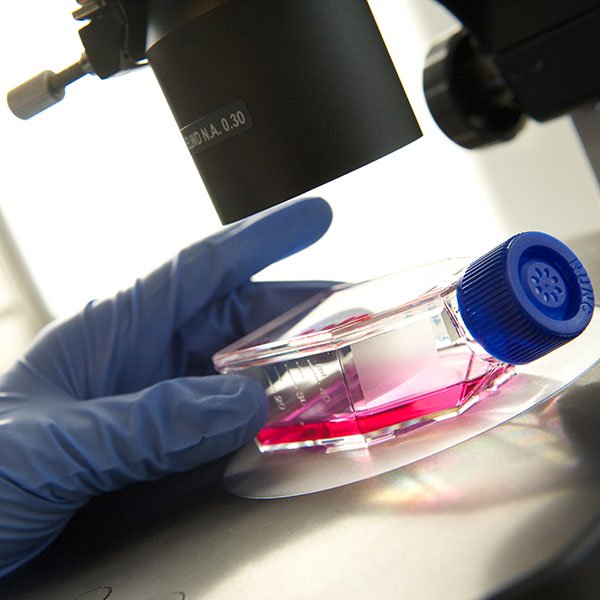MSc Molecular Microbiology
ApplyKey facts
- Start date: September
- Study mode and duration: 12 months full-time
Study with us
- develop knowledge and skills in areas such as genomics, molecular genetics and synthetic biology
- gain transferable skills in statistics, communication, ethics, science writing and critical analysis of data
- design experiments and analyse complex datasets
The Place of Useful Learning
UK University of the Year
Daily Mail University of the Year Awards 2026
Scottish University of the Year
The Sunday Times' Good University Guide 2026
Why this course?
Firstly, we offer you dedicated training in a broad suite of practical laboratory skills.
Secondly, this is complemented by two unique classes that develop your transferable skills in statistics, presentations, career development, and ethics, as well as honing your science writing skills and your ability to design experiments and analyse sophisticated datasets.
Thirdly, our taught classes capture the excitement of cutting-edge research fields and you'll be taught by active researchers or practising clinical professionals. There is a choice of classes that allows you to select a pathway to suit your future aspirations.
The Molecular Microbiology Masters provides the perfect springboard to future training at PhD level or gives you a range of skills and experience that will prove attractive to employers from industry or the healthcare provision sector.


Chat to a student ambassador
Want to know more about what it’s like to be a Science student at the University of Strathclyde? A selection of our current students are here to help!
Our Unibuddy ambassadors can answer all your questions about courses and studying at Strathclyde and offer insight into their experiences of life in Glasgow and Scotland.
What you'll study
You'll focus on the molecular biology of important microbial pathogens and industrial microorganisms and study the molecular mechanisms by which bacteria cause disease or can be exploited for the synthesis of biotechnologically important products.
The course content and research projects are driven by the expertise in microbial genomics, genetics and biochemistry research that exists within the Institute.
Studying a combination of compulsory and optional classes and a research project, you'll gain vital transferable skills in statistics, communication, ethics, science writing and critical analysis of data. In addition, you'll undertake:
- two semesters of postgraduate laboratories, developing the practical abilities and interpretational skills that will prepare you for your project and future career
- short optional classes - in vivo biology or drug discovery
- a compulsory microbiology class in clinical and applied microbiology
- a summer research project in molecular microbiology in an active research laboratory
Facilities
The course is taught in the Strathclyde Institute for Pharmacy & Biomedical Sciences.
State-of-the-art research facilities include:
- our own genome sequencer
- protein purification facilities
- mass spectrometers
- fluorescence microscopes
This allows you to benefit from first-hand experience in the latest molecular microbiological techniques.
Teaching Staff
The following staff are all involved in the teaching and research project supervision on the MSc Molecular Microbiology (project availability may vary year-to-year).
| Staff member | Research expertise |
|---|---|
| Dr Arnaud Javelle |
Research in Dr Javelle’s laboratory is focused on membrane proteins involved in transport of ions across cellular membranes and in signalling processes relating to ion availability. Studies of membrane transporters/channels have had a great impact on our understanding of human disease and drug design; indeed, ion channels are, at present, the third biggest target classes in drug discovery and about 30% of current clinically marked drugs are targeted against these proteins. |
| Dr Katherine Duncan | Dr Duncan’s research group investigates the chemical 'language' of marine microorganisms. This includes the influence and patterns of environment, ecology, biogeography and evolution on this metabolite exchange, with a focus on accelerating the biodiscovery of novel antibiotics from our underexplored oceans. |
| Dr Paul Herron | Dr Herron’s research interests include chromosome segregation in Streptomyces, Oxytetracycline productivity in Streptomyces rimosus and exploitation of Bacteriophages. |
| Professor Paul Hoskisson |
Research in Professor Hoskisson’s group is focused on the synthesis of antibiotics and the evolution of bacterial pathogens, using a range of techniques from molecular biology and biochemistry through to mathematical modelling and image analysis. The bacterial genus Streptomyces is the main focus of work in the research group due to its industrial importance, being responsible for producing around two-thirds of all commercially important antibiotics as well as numerous anti-fungal, anti-helminthic and anti-cancer drugs. |
| Dr Nicholas Tucker |
Research in the Tucker lab is focused on the application of genomics to the following areas:
|
| Dr Morgan Feeney |
Dr Feeney’s research interest involves developing new techniques for discovering new antibiotic-producing organisms such as from the genus Streptomyces - the most prolific producer of antimicrobial agents which is used to make more than 70% of antibiotics currently in production today. |
| Dr Leighton Pritchard |
Dr Pritchard’s lab focuses on computational biology and bioinformatics involving microbial whole-genome database and diagnostic marker design resource for classification, identification, and data sharing. |
Course content
If you choose to study this programme part-time over two years you can choose to take your classes so that they fit in with your work schedule. Module supervisors will be able to discuss this with you and help you with your timetable.
Learning & teaching
The course is delivered through lectures, tutorials and hands-on practical sessions. If you successfully complete the required taught classes, you may undertake a laboratory project for the MSc.
Assessment
Assessment of taught classes is through:
- multiple choice tests
- computer quizzes
- problem-solving scenarios
- poster and oral presentations
- essays
- formal written exams
The laboratory project is assessed through a written thesis.
Compulsory classes
Essential Skills and Employability for Masters Students (20 credits)
Refine your core skills in statistics, data presentation and career development while also learning about the ethical choices and dilemmas that you might face in your scientific careers.
Postgraduate Studies in Microbiology (20 credits)
In this module, you'll be exposed to the key concepts of bioreactor and process design, including the importance of downstream processing and process monitoring.
This module will also introduce the importance of systems and synthetic biology in advanced IB, and the roles of microorganisms in wastewater treatment, bioremediation and biofouling.
Learning will be achieved through lectures, tutorials and workshops.
Entrepreneurship (10 credits)
Learn from experts from the Hunter Centre for Entrepreneurship, what it takes to translate bright ideas in biomedical sciences into patents, business plans and spin-out companies.
Advanced Techniques in Biomedical Research 1 (10 credits)
This is a two-semester compulsory laboratory module. Both modules will help develop your skills in data analysis and report writing. This will help pave the way for a smooth transition into your summer research project, Advanced Topics in Biomedical Research.
This first module, which is delivered in the first semester will provide you training in key research skills in a range of standard techniques to be applied to specific problems in molecular biology research.
Elective Module
Choose one 10-credit module from the two optional practical modules across Semester 1 & 2.
In Vivo Biology (10 credits)
Gain real practical experience in the safe and ethical application of in vivo research by being trained to Home Office Personal License standard. Discover how in vivo biology has driven the development and testing of new drugs and medical techniques that save and improve human lives.
Compulsory classes
Advanced Techniques in Biomedical Research 2 (10 credits)
This is the second part of the two-semester compulsory laboratory module. This module will expose you to various assay procedures used widely in biochemistry, pharmacology, microbiology and immunology fields through hands-on laboratory exercises and further develop your analytical skills through workshops.
Advanced Topics in Biomedical Research (20 credits)
A unique and innovative module designed with three outcomes in mind:
- become an expert in the field that you'll study for your summer research project & learn how to write a review paper that aims to be publication quality
- learn how a scientific research career really works from the experts & then write the outline of a hypothetical research grant application
- enhance your teamwork on a virtual project to develop a hypothetical drug from high-content screen, through in vivo testing in models, to transcriptomics & human clinical trials & pharmacogenomics. You'll not only learn how to manage a project’s timelines & targets, but also enter the world of big data manipulation and analysis
Postgraduate Studies in Clinical Microbiology (20 credits)
In this module, you'll understand the principles of clinical microbiology from the perspective of:
- diagnosis by genotyping viable and non-viable approaches
- mechanism of antimicrobial resistance and treatment by antimicrobial agents
- epidemiology and control of infectious diseases
Elective Module
Choose one 10-credit module from the two optional practical modules across Semester 1 & 2.
Drug Discovery (10 credits)
The aim of this module is to introduce you to practical skills required to set up robust drug discovery assays in both academic and industrial settings. The pathway from pathology or biological pathway to small molecule drug candidate is explored in this unique module. Become familiar with the modern laboratory assays and screening approaches used by Big Pharma to develop their blockbuster drugs.
60 credits
Choose from a selection of research project topics in areas such as genomics, molecular genetics and synthetic biology. You can choose from four types of projects:
Laboratory-based experimental projects
These aim to develop a range of skills required for performing experimental research in a laboratory and generating novel data. The type of skills acquired are project-specific. These projects are appropriate if you're interested in a career in experimental laboratory research in industry or academia, e.g. PhD/research assistant/biology-based industrial company, where lab skills are of importance.
Critical analysis
These aim to develop a range of skills required for carrying out analysis of data reported in scientific literature. Skills include finding appropriate peer-reviewed studies, critically analysing the methods used and the data presented and coming to a clear conclusion whether the data support or refute a hypothesis. These projects develop skills in reading technical literature, formulating hypotheses, synthesising and critically appraising information and developing new ideas.
Data analysis
These aim to develop a range of skills required for carrying out analysis of scientific data. This could be data previously generated in the supervisor’s laboratory or data collected from previously published literature. They may involve generating and using spreadsheets and specialist data analytical packages. These projects develop skills in working with data, using statistical analyses, creating models, critically appraising information and developing new ideas.
Data-mining
These aim to develop a range of skills required for carrying out analysis of scientific data present in databases, e.g. genomic sequences. They may involve using spreadsheets and specialist data analytical packages. These projects develop skills in working with databases, data, using statistical analyses, creating models, critically appraising information and developing new ideas.
Entry requirements
| Academic requirements | Minimum second-class (2:2) Honours degree, or international equivalent, in a biological or chemical discipline. |
|---|---|
| English language requirements | You must have an English language minimum score of IELTS 6.0 (with no component below 5.5). We offer comprehensive English language courses for students whose IELTS scores are below 6.0. Please see ELTD for full details. As a university, we now accept many more English language tests in addition to IELTS for overseas applicants, for example, TOEFL and PTE Cambridge. View the full list of accepted English language tests here. |
Pre-Masters preparation course
The Pre-Masters Programme is a preparation course held at the University of Strathclyde International Study Centre, for international students (non-UK/Ireland) who do not meet the academic entry requirements for a Masters degree at University of Strathclyde.
Upon successful completion, you'll be able to progress to this degree course at the University of Strathclyde.
International students
We've a thriving international community with students coming here to study from over 140 countries across the world. Find out all you need to know about studying in Glasgow at Strathclyde and hear from students about their experiences.


I’ve learned a lot of valuable skills while on my course. The main ones I can think of, outside the laboratory, are presentation skills, how to conduct literature searches, and data processing.

The collaborative atmosphere at Strathclyde fosters teamwork, creativity, and innovation, enhancing the overall learning experience and encouraging interdisciplinary approaches to problem-solving and making its students industry ready.
MSc Molecular Microbiology
Fees & funding
All fees quoted are for full-time courses and per academic year unless stated otherwise.
Fees may be subject to updates to maintain accuracy. Tuition fees will be notified in your offer letter.
All fees are in £ sterling, unless otherwise stated, and may be subject to revision.
Annual revision of fees
Students on programmes of study of more than one year (or studying standalone modules) should be aware that the majority of fees will increase annually.
The University will take a range of factors into account, including, but not limited to, UK inflation, changes in delivery costs and changes in Scottish and/or UK Government funding. Changes in fees will be published on the University website in October each year for the following year of study and any annual increase will be capped at a maximum of 10% per year. This cap will apply to fees from 2026/27 onwards, which will not increase by more than 10% from the previous year for continuing students.
| Scotland | £12,550 |
|---|---|
| England, Wales & Northern Ireland | £12,550 |
| Republic of Ireland |
If you are an Irish citizen and have been ordinary resident in the Republic of Ireland for the three years prior to the relevant date, and will be coming to Scotland for Educational purposes only, you will meet the criteria of England, Wales & Northern Ireland fee status. For more information and advice on tuition fee status, you can visit the UKCISA - International student advice and guidance - Scotland: fee status webpage. Find out more about the University of Strathclyde's fee assessments process. |
| International | £32,900 |
| Available scholarships | Take a look at our scholarships search for funding opportunities. |
| Visa & immigration | International students may have associated visa and immigration costs. Please see student visa guidance for more information. |
| Additional costs | Course materials You will have to pay extra for your lab coat and safety goggles. All recommended textbooks are available in the library (and some freely available as online resources). However you may wish to purchase your own copies. Other costs There are returnable deposits for entry keycards and lockers (depending on your project location within Strathclyde Institute of Pharmacy & Biomedical Sciences). International students If you are an international student, you may have associated visa and immigration costs. Please see student visa guidance for more information. |
Please note: the fees shown are annual and may be subject to an increase each year. Find out more about fees.
How can I fund my course?
Scottish postgraduate students
Scottish postgraduate students may be able to apply for support from the Student Awards Agency Scotland (SAAS). The support is in the form of a tuition fee loan and for eligible students, a living cost loan. Find out more about the support and how to apply.
Don’t forget to check our scholarship search for more help with fees and funding.
Students coming from England
Students ordinarily resident in England may be to apply for postgraduate support from Student Finance England. The support is a loan of up to £10,280 which can be used for both tuition fees and living costs. Find out more about the support and how to apply.
Don’t forget to check our scholarship search for more help with fees and funding.
Students coming from Wales
Students ordinarily resident in Wales may be to apply for postgraduate support from Student Finance Wales. The support is a loan of up to £10,280 which can be used for both tuition fees and living costs. Find out more about the support and how to apply.
Don’t forget to check our scholarship search for more help with fees and funding.
Students coming from Northern Ireland
Postgraduate students who are ordinarily resident in Northern Ireland may be able to apply for support from Student Finance Northern Ireland. The support is a tuition fee loan of up to £5,500. Find out more about the support and how to apply.
Don’t forget to check our scholarship search for more help with fees and funding.
International students
We've a large range of scholarships available to help you fund your studies. Check our scholarship search for more help with fees and funding.
Careers
After graduating you should be ideally qualified for positions in the biotechnology and pharmaceutical industries, as well as hospitals and universities.
You may wish to continue your studies for an MPhil or PhD degree.
This course provides the background training for a career in:
- pharmaceutical & biotechnology industry laboratory research posts
- laboratory technical support
- medical/pharmaceutical/life science sales
- academia, following a further PhD route
Glasgow is Scotland's biggest & most cosmopolitan city
Our campus is based right in the very heart of Glasgow. We're in the city centre, next to the Merchant City, both of which are great locations for sightseeing, shopping and socialising alongside your studies.
Apply
There is currently no deadline for submitting applications. However, we encourage you to apply early as we consider applications on a first come, first served basis, and may introduce an application deadline due to high demand.
Start date: Sep 2026
Molecular Microbiology
Contact us
Have you considered?
We've a range of postgraduate taught and Masters courses similar to this one which may also be of interest.

